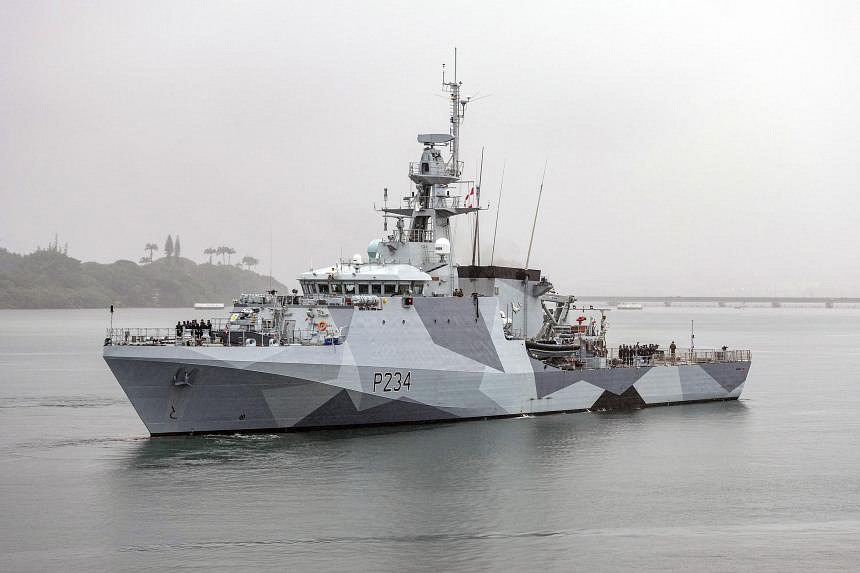Britain looks to boost defence ties with Singapore with ships deployed in region

(Photo credit: UK Ministry of Defence)
Source: The Straits Times
Britain’s Royal Navy is looking at ways to step up its interactions with the Republic of Singapore Navy (RSN) with a pair of British ships currently operating in the Indo-Pacific region.
This is according to Colonel Eddie Maskell-Petersen, his country’s defence adviser to Singapore and head of its defence staff for South-east Asia, speaking during a press conference on Aug 14 at the offices of the British Defence Singapore Support Unit (BDSSU) in Sembawang.
He said that RSN personnel will visit the offshore patrol vessel HMS Spey, while it is moored at the Sembawang naval installation, to discuss with their Royal Navy counterparts ways in which both navies can expand joint training and other collaborations.
These include the possibility of holding dedicated bilateral exercises, said Commander Paul Caddy, the commanding officer of the HMS Spey.
The Spey is one of two offshore patrol vessels in the Indo-Pacific region. The ship, along with the HMS Tamar, has been on a long-term deployment in the region since September 2021 as part of efforts to bolster Britain’s presence and enhance regional security.
The ships have conducted missions such as patrols against illegal fishing in the South Pacific and monitoring United Nations sanctions against North Korea.
The Singapore Armed Forces (SAF) has not held bilateral drills with the British military since the early 2000s, although both militaries regularly train together in multilateral exercises such as those held under the auspices of the Five Power Defence Arrangements (FPDA).
Singapore’s Ministry of Defence has confirmed to The Straits Times that the RSN is exploring holding joint activities and interactions such as a passage exercise to enhance mutual understanding. It added that both navies interact regularly, citing the FPDA exercises as an example.
The FPDA, which also includes Australia, Malaysia and New Zealand, was established in 1971. In addition to conducting military training, the grouping provides consultation for the external defence of Singapore and Malaysia in the event of an armed attack.
Logistics support
The Spey and Tamar, which is still at sea, have been supported in part from Singapore by the BDSSU, their primary logistics hub. The unit’s facility is next to Sembawang Shipyard, which was itself part of a larger British naval base in Singapore till 1971.
Today, the BDSSU is part of Britain’s permanent commitment to the FPDA. Its Sembawang wharf provides berthing for FPDA naval vessels and those of other nations when they call at Singapore.
British naval auxiliary vessel Argus was docked there during ST’s visit on Aug 14. The ship is here as part of a Royal Navy littoral response group deployment to the Indo-Pacific.
The Argus is a versatile vessel that can serve as a hospital ship with beds for up to 90 patients and has an operating theatre and an intensive care unit.
Before arriving in Singapore, it carried a contingent of Royal Marines, along with three helicopters, that took part in exercises with their US counterparts and Australian troops in Australia.
The BDSSU also manages the nearby Senoko Oil Fuel Depot, which provides fuel to visiting warships and specialised marine aviation fuel to the SAF.
According to the BDSSU’s commanding officer Edwin Cooper, the depot was built in 1938 as part of the British naval base.
The BDSSU employs 30 staff, including 25 Singaporeans, a far smaller number than the estimated 25,000 Singaporeans working in British bases here when the former colonial power pulled out in 1971.
The press conference on Britain’s contribution to security in the region was also attended by Mr Nik Mehta, the new British High Commissioner to Singapore, who replaced Ms Kara Owen in July 2024.
Mr Mehta said a British aircraft carrier strike group will visit the Republic in 2025 to mark the 60th year of Singapore’s independence and anniversary of diplomatic relations between both countries.
“It’s a unique opportunity for us to do defence engagement in a very, very special way, and we are going to be as creative and as dynamic and as ambitious as we can be”, he said.
